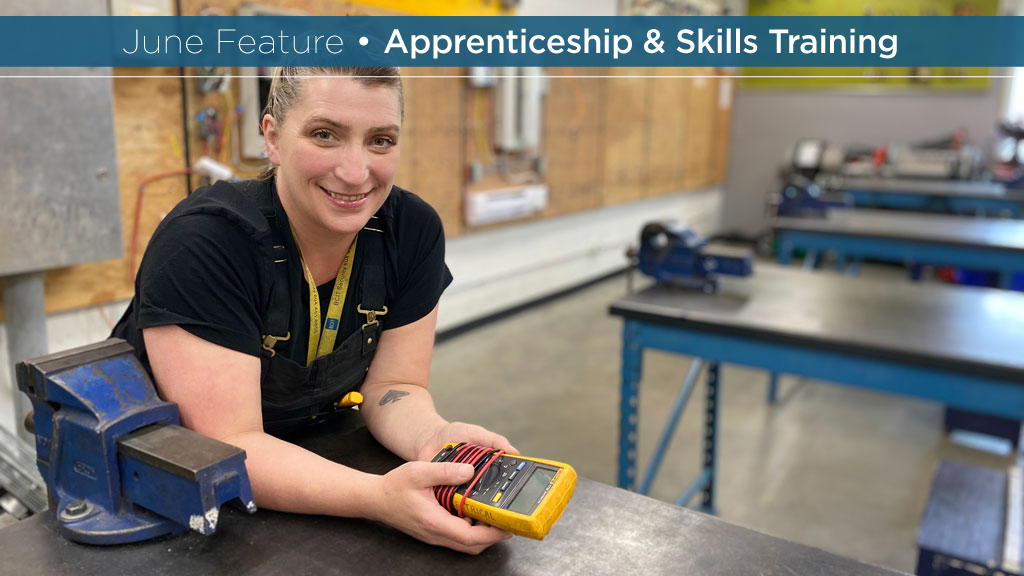The (BCIT) recently announced electrical instructor Kavan Smith has won a 2024 Excellence in Teaching award. 
Smith, who has been a Red Seal electrician for 13 years, says she is pleased and proud to have been recognized.
“I am so flattered by this award,” she says. “I have never been awarded something like this before. It’s a real honour.”
Smith took the scenic route to becoming an electrical instructor.
“I was born in England where dad was going to school,” she says. “We moved to Victoria when I was a baby. Then we moved to Nova Scotia, back and forth every year, until we settled in Vancouver when I was nine.”
Time passed.
“I became an English teacher – thank you university – but I wasn’t enjoying it,” says Smith. “What I did enjoy was snowboarding, but I couldn’t make any money doing that. So, I started driving a plow truck and a loader, which I also hated, but at least I was making money.”
Smith says she was looking for a way to stay on the ski slopes.
“I thought of becoming a millwright, but I figured it would be too tough on my body,” she says.
So she went to trade school, three of them in fact, and became an electrician.
“I love the physicality of it,” she says. “I love working outside. I love building things with my hands and being a part of a crew building something together. I love looking up at the lights of the North Shore mountains and knowing I put some of them up there.
“I love the money. I love the diversity of the work. It’s been a fantastic career.”
Smith says the opportunities open to an electrician are endless.
“I recently read about a guy, an electrician, who saw a picture of Antarctica on a magazine rack and was dazzled by it,” she says. “A year later he was working down there.”
Smith says the job also comes with challenges.
“The work can be physically demanding,” she says. “I had carpal tunnel syndrome before I got off the tools to teach. And my hearing is pretty bad because I’ve worked around loud equipment.”
Smith says she thinks it was always in the cards that she would become an instructor.
“Teaching has always fascinated me, even though I had a horrid time in trades school,” she says. “I barely passed. I felt like an idiot the entire time, and then I felt lost when I got out into the field. That’s what it was like until I worked with people who knew what they were doing.”
Smith says she wants to change the way the trades are taught.
“This field is so cool, and people get excited about it,” she says. “They sign up for the trades because they think, ‘I want to work with my hands and be physical,’ and then we promptly sit them down for 10 weeks.
“There’s a better way to do this. I’m not quite sure what that is yet, but it’s my goal to find out.”
One of the challenges facing construction now is attracting more young people into the industry.
“That’s the big question right now, isn’t it?” says Smith. “The has a great ad campaign out right now, the ‘this is what a (fill in the trade) looks like,’ with eye-catching images of people out having fun fishing or mountain climbing. That’s something significant – a rebranding of the trades.”
Smith says when she was young, she didn’t realize that it was possible for her to become a “sparky.”
“I grew up with academic parents, both of whom taught at post-secondary schools,” she says. “I think many people, especially women, don’t realize that the trades are an excellent career. Fortunately, the more people know about the trades, the less they fear.”
In addition to BCCA’s campaign to promote the construction trades, mentoring, outreach into high schools and traditionally underrepresented groups in society need to take place.
“Being a woman in trades has a unique set of challenges,” says Smith. “The toughest is feeling lonely because there are so few of us. There are changes afoot, however. I had to wait in a line for the bathroom the other day, at trades school. The shift has begun to a more diverse workforce and it can do nothing but improve the work, both socially and mechanically.”



Recent Comments
comments for this post are closed